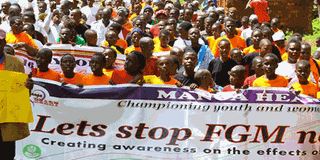Alarm over medicalisation of FGM in Kisii

Residents of Nyamira County including children march to celebrate the 16 days of activism against gender-based violence on the Kisii Chemosit Highway, last year. The county is among those registering high FGM cases. PHOTO | BENSON MOMANYI | NATION MEDIA GROUP
What you need to know:
- Kisii County has the third highest rate of FGM in the country
- County on the spot over alleged medicalisation of the outlawed practice
- Those engaging in the practice using medical officers to avoid arrest
- Elites from the community living in other towns send their daughters to the rural areas during school holidays to undergo cut
- Unicef says about 4 million girls and women aged 15-49 years in Kenya have undergone FGM
In 2011, Kenya passed a law prohibiting Female Genital Mutilation (FGM) imposing tough penalties on perpetrators.
The law not only banned the practice in Kenya but also prohibited cross-border FGM and barred medical personnel from carrying out the outlawed practice. In addition, the law also held that consent cannot be cited as an excuse for conducting FGM on girls and women.
Since the law was passed, the country has witnessed a decline in the number of girls undergoing the cut.
Currently, Kenya’s FGM prevalence stands at 21 per cent down from 27 per cent in 2008.
However, despite the strides made, FGM remains rampant in some parts.
Kisii County, which has the third highest rate of FGM in the country is the latest to be put on the spot over alleged medicalisation of the outlawed practice, with doctors and other medical practitioners undertaking it.
CULTURAL PRACTICES
The details emerged during a Twitter discussion convened by MenEndFGM, on how to end the illegal practice. The outfit rallies men to join the fight against FGM and other harmful cultural practices.
Some of the participants in the discussion raised concern over the medicalisation of FGM in Kisii, posing a challenge in the fight against the outlawed practice.
“Sadly, residents have devised a way to sanitise FGM through medicalisation,” said Mr Joel Wamogusero.
Another participant said those engaging in the illegal practice in the county had become innovative and resulted to using the medical officers to avoid arrest.
MenEndFGM also revealed that elites from Kisii community living in different towns and urban centers send their daughters to the rural areas during school holidays to undergo the cut.
“Some of the mothers will take their girls for ear piercing where the medicalised FGM is also carried out. This helps to conceal the cut as the girls will be taking antibiotics to heal the ‘ear piercing’ and no one will suspect,” MenEnd FGM tweeted.
The organisation added lack of a functioning safe houses for girls was also hampering rescue efforts for those at risk of being circumcised.
MARRIED OFF
To turn the tide, Wamogusero said they have incorporated doctors and medical practitioners in their stakeholders meetings.
“We are working with them to try and find an amicable solution to the medicalisation of FGM,” he said. “We also need a policy to fight FGM at the county level. This will make it easy to lobby for resources allocation from the county government.”
Bernard Morara called on individuals and organisations to continue with their campaign against the practice since after FGM, the girls are married off denying them their right to education.
Last week, Anti-FGM Board CEO Mrs Bernadette Loloju said the government is committed to end the illegal practice in Kenya by 2022.
Loloju said provincial administrators among them chiefs, police, and Ministry of Health officials, elders and religious leaders are on high alert to ensure no cases of FGM occurs more so at this time the country is battling Covid-19 pandemic.
The Board last month raised the red flag over the possibility of an upsurge in FGM cases in the country during this period.
In a statement, the board indicated that girls are at a high risk of the cut silently in in their homes now that they are out of schools in this period of the Covid-19 pandemic.
Last year, the government launched a National Policy on Abandonment of Female Genital Mutilation 2019.
CAMPAIGN
Through the policy, the State has placed those subjected to and at risk of FGM, religious leaders, traditional justice systems in FGM practicing communities and stakeholders involved in Anti-FGM advocacy in the country at the center of the campaign to wipe out the menace.
According to United Nations Children's Fund (UNICEF) about 4 million girls and women aged 15-49 years in Kenya have undergone FGM.
North Eastern counties such as Mandera and Wajir have the highest prevalence rates of over 90 per cent.
Data from a 2017 survey by National Population Council (NPC) shows that 72 per cent of Kenyan women who have undergone FGM are from North Eastern, Rift Valley and Nyanza regions.


